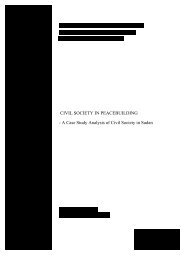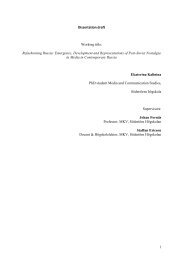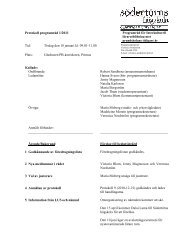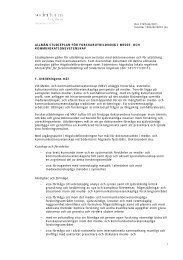Underlying Reasons for the Persistence of Female Genital Mutilation
Underlying Reasons for the Persistence of Female Genital Mutilation
Underlying Reasons for the Persistence of Female Genital Mutilation
Create successful ePaper yourself
Turn your PDF publications into a flip-book with our unique Google optimized e-Paper software.
morals and fundamental rights, public health and safety as well. The interests <strong>for</strong> <strong>the</strong> support <strong>of</strong><br />
<strong>the</strong> practice underlie <strong>the</strong> grounds <strong>of</strong> culture, tradition and minority right which <strong>the</strong> human rights<br />
framework provides 70 . However to end FGM <strong>the</strong>se measures confronts <strong>the</strong>se rights through <strong>the</strong><br />
right <strong>of</strong> culture. International laws are also insufficient because <strong>the</strong>y are not absolute. States hold<br />
<strong>the</strong> ultimate responsibility to implement legislations and take action. As Tanzania has ratified<br />
<strong>the</strong>se conventions, and implemented laws that condemn <strong>the</strong> practice <strong>of</strong> FGM, changes could be<br />
discovered in <strong>the</strong> study area. As AFNET were active in <strong>the</strong> 90’s and early 2000, many had seen<br />
changes. The <strong>the</strong>ory stating that cultural traditions are not static and are socially constructed;<br />
changes have shown that <strong>the</strong> practice does not persist over time. By activities from NGOs and<br />
<strong>the</strong> implemented legislations, many parts <strong>of</strong> <strong>the</strong> areas affected, <strong>the</strong> practice declined. An attitude<br />
change has been positive in Babati district given <strong>the</strong> interviews conducted in <strong>the</strong> areas where<br />
FGM used to be per<strong>for</strong>med. The general public was against <strong>the</strong> practice because <strong>of</strong> <strong>the</strong> negative<br />
consequences <strong>of</strong> <strong>the</strong> procedure and <strong>the</strong> agreement that it is an outdated custom. The man from<br />
Gallapo agreed that it was an ineffective tradition, and from a man’s point <strong>of</strong> view considering<br />
<strong>the</strong> male domination <strong>of</strong> <strong>the</strong> issue, this is a positive change. One <strong>of</strong> AFNET’s main goals was to<br />
reach <strong>the</strong> Ngaribas, <strong>the</strong> women per<strong>for</strong>ming FGM on girls. If <strong>the</strong>y chose to stop with <strong>the</strong><br />
procedure one core problem would be stopped. However, it does not approach <strong>the</strong> issue<br />
undertaken that it is <strong>the</strong> system <strong>of</strong> beliefs surrounding <strong>the</strong> tradition. Changes <strong>of</strong> attitude towards<br />
<strong>the</strong> practice do not conclude changes in behaviors. The adjustment <strong>of</strong> <strong>the</strong> custom through time<br />
shows that attitudes and behaviors are not easy to change.<br />
Referring back to Kevin Avruch definition <strong>of</strong> culture that takes <strong>for</strong>m in emotional framework<br />
embodied as symbols, metaphors, schemes or images, by which individuals interpret and act in<br />
<strong>the</strong>ir social worlds. This can be interpreted in <strong>the</strong> social convention that is FGM and how it has<br />
been passed on as tradition. Culture and tradition are seemed as influential <strong>for</strong>ces shaping gender<br />
roles and family relations. In many communities, culture and tradition is a way <strong>of</strong> living and<br />
belonging to a community, which is a self-evident right. To view FGM as cultural relative,<br />
considering its own terms and conditions, important factors constitutes that <strong>the</strong> custom has been<br />
shaped and reshaped <strong>for</strong> hundreds <strong>of</strong> years, and has adjusted to how it is perceived in different<br />
communities and ethnic groups. The various perceptions about FGM have created beliefs in what<br />
70 United nations, UDHR art 2 <br />
31

















